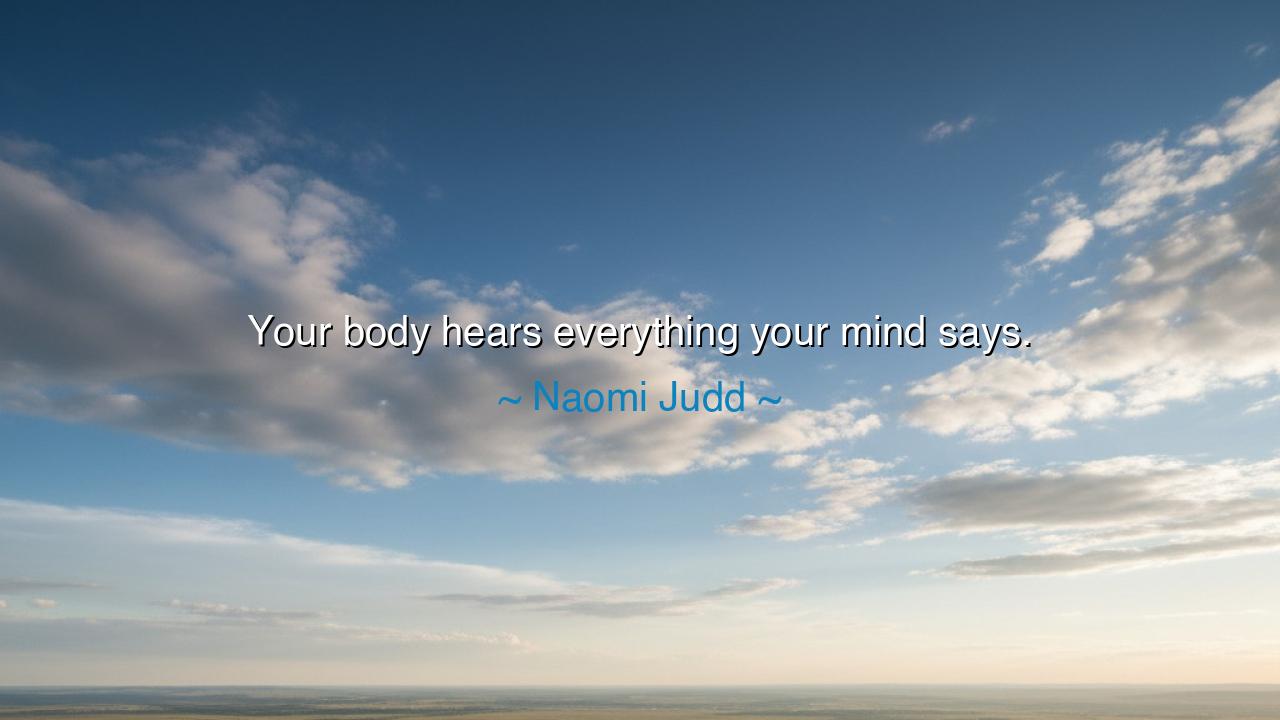
Your body hears everything your mind says.






“Your body hears everything your mind says.” Thus spoke Naomi Judd, a woman who knew both the music of triumph and the silence of pain. In this simple but profound truth lies a mystery as old as humanity — the sacred bond between mind and body, between thought and flesh. Her words echo like a whisper from the ancients, reminding us that every idea, every emotion, every unspoken belief is not imprisoned in the mind alone, but ripples through the whole being. The body listens to our inner dialogue, obeying the tone of our thoughts as faithfully as the sea follows the moon.
Judd’s insight was not born from idle reflection, but from the crucible of her own struggle. She battled illness, despair, and the shadows of depression, learning firsthand that the mind can wound the body as surely as a blade, and that hope can heal what medicine cannot reach. She understood that when we speak cruelty to ourselves, when we fill our hearts with fear or bitterness, the body responds — tightening, weakening, aching beneath the weight of unseen words. But when we speak gently, when we fill our thoughts with courage and compassion, the body also responds — it straightens, breathes, and begins to mend. Thus, her wisdom became not only personal but universal: what we think, we become; what we feel, we embody.
The ancients spoke of this truth in many tongues. The philosophers of Greece said that a sound mind dwells only in a sound body. The healers of China taught that the flow of energy, or chi, moves according to the harmony of one’s emotions. And in India, the sages of old saw the mind as a sculptor, shaping the body with the chisel of thought. Modern science, too, has only begun to confirm what the wise have always known — that the chemicals of the brain obey the language of belief, that stress can sicken the heart, and that gratitude can strengthen it. Indeed, Naomi Judd’s quote is a modern echo of an eternal law: that body and mind are not two, but one.
Consider the story of Viktor Frankl, the psychiatrist who survived the Nazi concentration camps. Surrounded by hunger, disease, and death, he saw that those who lost hope soon lost life, while those who found meaning endured against all odds. He wrote, “The last of human freedoms is to choose one’s attitude in any given set of circumstances.” His mind gave his body strength, his spirit commanding life to continue when all else seemed lost. Through him, we see Judd’s wisdom in motion — that the body listens, that it bends to the authority of the soul’s resolve.
But this truth is not only for moments of great suffering. It lives in our daily lives. Every sigh of discouragement, every anxious thought, every quiet resentment — these are the messages we send to our body, and it obeys. It grows weary, it tenses, it forgets how to rest. Likewise, every thought of gratitude, every word of kindness, every prayer or laugh — these are medicines that flow unseen through our veins. The body listens and rejoices. Thus, we are both the cause and the cure of much of our own suffering.
Naomi Judd’s words are, therefore, both warning and invitation. They call us to become guardians of our inner speech, to speak to ourselves as we would to one we love. To fill the mind with anger and despair is to feed the body poison; to fill it with peace and purpose is to nourish it with life. The body is the instrument through which the song of the mind is played. If the music of thought is harsh, the melody of life will be discordant; but if the thoughts are gentle and strong, the body will sing in harmony.
So, dear listener, take this teaching to heart: watch your words, both spoken and unspoken, for your body is listening. When you wake, greet yourself with kindness. When you are weary, speak peace to your heart. When you face fear, remind your mind that courage is stronger. Train your thoughts as a farmer tends the soil — for whatever seeds you plant there will grow in your flesh, your energy, your destiny.
Practical actions for the seeker: Begin each day with a thought of gratitude — it is the simplest elixir. When your mind darkens with worry, pause and breathe deeply, saying, “I am safe, I am capable, I am whole.” Speak to your body with love — stretch it, rest it, feed it well, and it will repay you with strength. And when life wounds you, as it surely will, remember Naomi Judd’s wisdom: your body hears everything your mind says. Therefore, speak to it as a healer, not a critic; as a teacher, not a tyrant. In doing so, you will find the union of mind and body, and through that harmony, you will find peace.






AAdministratorAdministrator
Welcome, honored guests. Please leave a comment, we will respond soon